“The Ballad of Buster Scruggs” and the nature of Death
The mythical age of the cowboy for the most part never existed, or at least didn’t exist in the common understanding. It was a far Blacker (in a literal sense since many cow folk were Black) and it was a far less chaotic affair, not to say peaceful by any means but if the movie Western were to be taken as fact, the “Wild West” as the name would imply was a land of death and suffering.
The facts of the age don’t meet such a conclusion. Most towns had more than a single mortality per year. But the legends of the “West’ being a lawless land of renegades and outlaws is forever implanted in the public consciousness of America.
The film anthology, The Ballad of Buster Scruggs, doesn’t engage with those facts however, it instead takes from the myths of the outlaws and ties them together with a bow under the umbrella that transcends culture.
Death.
The various stories are overwhelmingly filled with death. But even so, each has its commentary on the myriad aspects of death. Some see it as a chaotic, random, messy sort of affair. Others show it as an offputting but welcoming friend in the darkness. But one thing they all share is death comes.
Buster Scruggs and the value of “death”
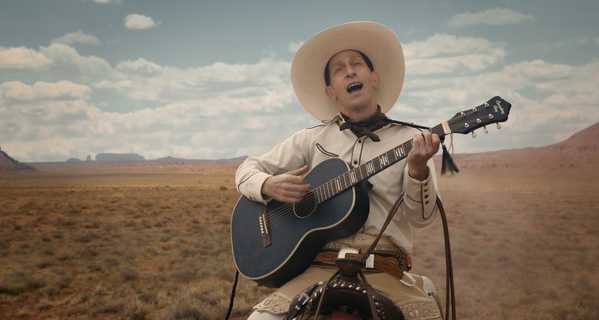
Heroes are a weird concept in the Western canon. The audience whether literary, cinematic, video game, or however else media can be consumed is often given actions by the protagonist that could be read as villainous. It has been remarked that in films as of late people need to be explicitly told that a character’s actions are bad and must in the universe be condemned lest people take away the wrong messages from a story.
Buster Scruggs reads as a traditional old-school western in the sense that Buster is at all points in control of the plot until his demise. More so even because he’s able to speak directly to the viewing audience.
Buster is a mass murderer and a serial killer. This is not a moral judgment but a summation of his actions in the story. Buster kills a bar full of men. Kills a man after a game of poker, kills his brother, and then is killed in turn.
Blood is cheap in his vignette, he kills and is subsequently killed. When he trades his “spurs for wings”. It’s treated with much more weight to the audience. But meaningfully, his death had little to no importance on the world at large. He kills man after man, not for justice, not for bounty, but after antagonizing them and baiting them into attacking him. What does it say? Is he immoral? Is death?
Death follows Buster through his actions. In another genre, his ambivalence to murder would have him labeled a psychopath. In this film, he meets a cowboy in black and dies from overconfidence. But notably, he isn’t sent to hell for his crimes. He is instead shown ascending to the heavens. So is death redemption in his case? He was acting in self-defense, even after goading his attackers. So he is shown as a sort of innocent murderer.
Death served not as a punishment but as a sort of award.
Near Algondones and the meaningless of death
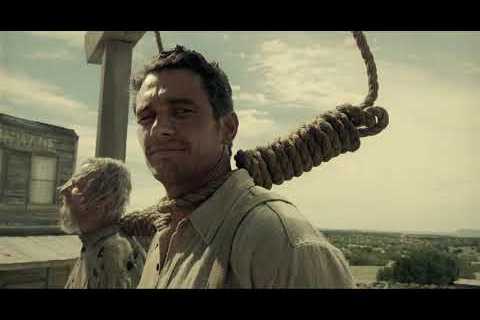
Near Algodones is a short vignette about a robber who intends to run a heist on a bank only to quickly be caught tried and sentenced to hanging but he’s never hung he is instead captured by some natives thus escaping death except he doesn’t escape death because he is then quickly tried and convicted of a crime he didn’t commit and hung and that’s an interesting story to think about with regards to death.
At no point during the story was our protagonist played by James Franco in control of his fate from the moment he committed his crime he was dead but what means it can be extracted from that don’t do bad things we don’t learn why he was robbing that bank, but the audience can make assumptions from the context of being in the lawless West. That leads to questioning what meaning can be ascribed there. Is the irony that he is innocent of a crime he didn’t commit but he’s still guilty of a crime he did? Is the irony that in his death the people who tried him and convicted him didn’t care and they didn’t know.
Meal Ticket and the measure of life and death

Meal Ticket is a curious story of a disabled youth and his caretaker only titled the Impresario. Together the pair goes from town to town where Harrison recites poetry and stories and Shakespeare while the Impresario collects the money and they have a nice thing going but they aren’t killing it. We get to see that the Impresario quite clearly isn’t very happy with the man that he is taking care of.
As the story progresses, he learns of a chicken who can do tricks. He sees it as a new meal ticket but this chicken is trained and doesn’t know any sort of mathematics. It’s too late though and even if it wasn’t it doesn’t matter to the Impresario. He sees a new meal ticket and quickly disposes of his burdensome Harrison.
This story is rife with the nature of the exploited worker and the greedy capitalist. We can see from the capitalist perspective, that money is dwindling. They are not making a lot of money, but we also see that the owner is not smarter than the worker. The Impresario is not Harrison. He’s not more well-read than Harrison. Truth be told, he brings nothing to the equation other than the fact that without him Harrison dies. But here’s the key part. He dies without Harrison. The audience is made aware of Harrison’s talent. But the Impresario? He doesn’t do much of anything with regard to labor. In so far as he’s taking care of Harrison in ways Harrison can’t take care of himself but the audience isn’t made aware of how he came upon Harrison. It isn’t known if the Impresario is his father or his friend or just a caretaker. In that area of ambiguity, the unknown history of how these two men came to be, the audience is only shown that Harrison is dependent on the Impresario but likewise, the Impresario is dependent on something other than himself doing the work. The relationship works until the Impresario chooses to take in another way of making money and dispose of Harrison.
Perhaps, Harrison could have had a backup play but we see he should be the perfect dependent. He can’t be self-sufficient. He is only able to provide what he is able to provide. He cannot take care of himself. He is at the mercy of this man whose mercy is only as long as the money that he has gotten that day. Instead, for the lion’s share of the story, Harrison is the breadwinner. The moment that he sees a better opportunity is the moment that he disposes of Harrison even though Harrison has a history of making him money and more importantly, Harrison is responsible for his survival as well. There are hints before the purchase of the chicken that this chicken is not actually as smart as the Impresario believes it to be which further drives home the purpose or rather the point of the story which is to say death came to Harrison after he stopped being useful to the Impresario but death will also come to the impresario due to his short-sighted greedy nature greed takes all with it including your life.
All Gold Canyon and the Karmic Death
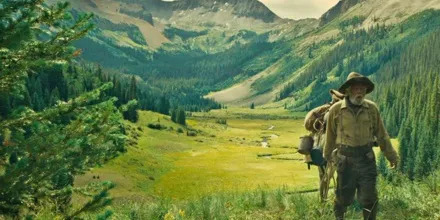
Tom Waits is a prospector. He’s seeking his fortune in a Canyon. Chasing gold as many in the West did. In the course of his chapter we see his determination but what is that determination to be read as?
In the previous chapter, the audience sees a worker exploited until their final day to be discarded for what their boss presumes is a better venture. The prospector of the All Gold Canyon exploits no person but themself.
That said they do exploit something, the land, Earth itself.
The All Gold Canyon is a story that has been analyzed quite often by many others and the consensus is that it is a story of karma that the prospector is spared due to his ability to not take everything from the land, greedily. This is compared with his would-be robber-murder who tries to steal everything from him.
It is a perfect contrast to the Impresario from the previous vignette who takes and takes and takes from a resource that cannot protect itself we see with our prospector that he takes from nature but does not take unthinkingly, he does not suffer from gluttony as a sin. He still exploits nature but exploiting nature is not seen from a sense of morality In the film’s view it is instead seen as of nature itself.
The Gal who got Rattled and death of innocence
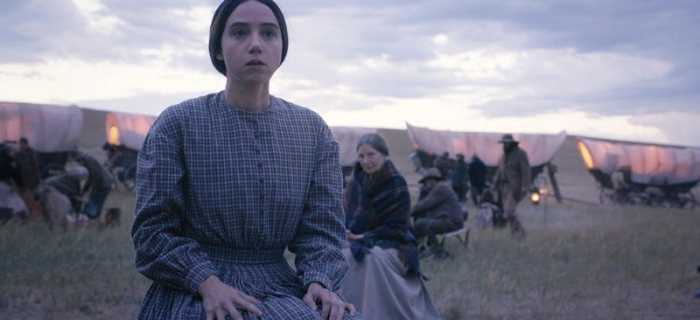
How does one measure the worthiness of someone to die? Often when a tragedy happens there is a narrative of how “innocent” or “good” a person was. How does one grade choose?
The Girl Who Got Rattled is a tragic story when one thinks about it how does one grade the life of an innocent? In The Girl Who Got Rattled we see a young woman who is not allowed to make decisions on her own be separated by Death from her let’s say impolite or inconsiderate older brother the wagon driver then woos her and it seems that there will be a happy ending for her but they are quickly besieged by a band of Native Americans and after being warned that if the man who is protecting her goes down that she should kill herself she kills herself following orders what is it say that she follows orders till the day that she died including the order to kill herself.
The titular girl is played for all intents and purposes as the perfect embodiment of femininity she is demure she’s gentle she is kind she defers to her male leads she doesn’t have much autonomy except in the moment that she dies but even then she is tall but if she didn’t die it was going to be worse than death so did she even have a choice then it’s fun to think about darkly.
The Mortal Remains and Confronting Death
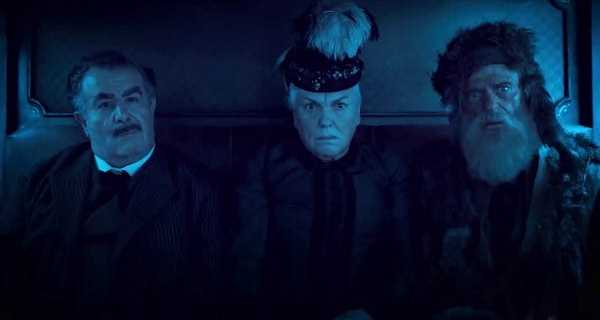
What happens when a person dies is a common point for speculation. Is death a random event a dreadful predator, a loving friend, or a shadowy stalker? The Mortal Remains presents death or at least “reapers” as amicable jaunty singing bounty hunters.
The segment, the last in the anthology features the reapers one dubbed Clarence, the Englishman, and the other Thigpen, the Irishman, and three individuals The Lady, The Frenchman, and the Trapper.
The Trapper is quite loquacious and able to elucidate for a time innumerable as he seemingly has lost all sense of brevity and social boundaries as he drones on and on about the various particulars of his life and his experiences throughout his life. He rambles and rambles until the Lady cuts him off.
The lady is presented as a Karen if you will. She is curt, off-putting, and a bit rude as she says that the world can be divided into two groups of people upright and sinning. She believes herself to be in the upright category and she views many others as sinners. She’s traveling to meet her husband and she is quite overcome with joy to see him again
The “Frenchman” on the other hand plays on the nature of man, questioning if her husband wants to see her. This infuriates her to such an extent that she can’t seem to catch her breath. The French to his credit, tries to signal to the Coachman but the driver keeps going.
It is here the tone of the story changes. The lighting, the ambiance, and the mood, in general, shift to a much more morose pitch.
The “Reapers” then say that their usual method of killing people is to distract them and then one thumps them which is how they came to have their current Quarry they finally meet or arrive at the hotel in Fort Morgan they disembark and they all make their way into the hotel notably without bags.
What does it say about how these people encounter death?
Is it better to slip unknowingly into the abyss to go gnashing and fighting and angrily into the darkness or to accept it for what it is and go with the understanding that life and death are but states of being mortal remains does a wonderful job in translating that fear of the unknown into three very understandable perspectives whether one is uncertain angered or at peace we all must accept what happens at the end of the ride.
What do you think? Leave a comment.










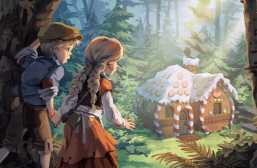
One of the most racist western films ever, a collection of short films anyway.
Portraying every Indian as savage aliens, where suicide is preferred to being caught by one.
Disgraceful stuff from coen bros
Surely that just reflects how most white people saw them at the time.
@Rios: Probably. Still racist, though.
@Gianni: Yes, and do NOT get me started on the ableism.
The Coen Brothers are great movie makers, Buster Scruggs is not good. Anybody who loves their work can surely see these missteps for what they are. Not one story works satisfyingly and the overall arch of meaning is flimsy. There are moments and great shots but that’s all. A good movie has one big deep breath of a story – these are short pants.
It was brilliant, need to go back again just to catch every single line
Actually, I randomly saw this last night and it is breathtaking. Visually stunning, genius script and stellar performances.
I’m concerned about the increasing Netflix launch of movies. Just like the high street shops, the very last independent cinemas will be next to disappear.
Wonder if brothers Coen are concerned about that as they took the bumper cheque from Netflix?
I’ve been a fan of theirs from the start, but it seems this is where the trail ends.
Should be a good yarn!
Should be six.
The Coens are one of the few active filmmakers I follow very closely.
Never grow tired of watching their movies, a new one is always a little ray of sunshine especially in gloomy times such as these. They seem to sum up neatly the tragi-comedy that is the human species.
The movie is essentially about storytelling.
All the stories are about death (and chance), but the point is that they are all subtly connected by lines of dialogue, things that reoccur only flipped in another context in different scenes and similar characters. This is how storytelling used to work when everyone read the same stories; you picked up unstated things from other similar stories as given and drew connections between characters and scenes in different stories in the same way.
That made the classical prerevisionist western stories each a part of a wider story (generally shared with obvious exceptions) about the conquest of the west. Representing this shared mythos is the point of this (I think), and this is also why the indians are only present as a force of chaos or chance as the classical westerns were not really interested in them as characters (they were either savages or impossibly noble).
Note how they show up twice, once so a guilty man is saved and once so an innocent woman is killed. This is a movie I think will fuel discussion for a while as there is so much going on, and it is by a considerable margin the best english language movie I have seen this year. And, as you are surely curious, my preference is 3 > 4 > 5 > 2 > 6 > 1. Thanks for the article.
Great article with an interesting analysis! It was a pleasure to edit! Thanks for the good work!
The Coens have been their own genre since Miller’s Crossing.
First of all I’m happy that the Coen Brothers tread the progressive path (Netflix) with a film that is way beyond True Grit. TG bowed to genre and tradition, which TBOBS does but more ironically charged. Buster’s chest patting move reveals a cowboy’s silhouette of dust which stands in the air for a second, the young soft woman commits suicide under ambush just a bit too hasty when given a colt for the first time (gun law reference my friends overseas), where TG wallows and indulges TBOBS strides past unflinching (violence hyperbole).
Moreover, I’m absolutely delighted by the initial sequence of the Tom Waits episode. In a sequence of shots a valley is depicted in such a breathtaking beauty that immediately masterpieces by Bierstadt, Schafer or Gast came to my mind.
In this short sequence the animals play a major role. I always loved wildlife documentaries but I’ve never before seen such a consequential setting establishment in film before. Of Mice and Men’s first page comes to mind! It is incredibly beautiful and so cool to film just as for Discovery Channel but it is to establish the grounds where in juxtaposition the old gold digger begins a trail of human folly and vice. Always a good time to be at film school when the Coens are up and about.
It’s an incredible film! 5/5
The Coens are the best. They re-invented the movies. I love what they have done.
Honestly i wish the whole movie was about buster Scruggs I didn’t care for the other shorts as much I just wanted to see more buster and when I realized the other stories didn’t connect to him at all other than the fact the all have death in them I was highly disappointed and found myself wanting to go back to the beginning to watch buster Scruggss short.
I kept hoping The Girl and The Dude would’ve had a happy ending; the Guy who fought the Indians reminded me of Jim Varney. What hits most was the Guy who basically said “fuck it” tipped his hat and accepted his fate in the last story.
I agree and their True Grit remake was a wonderful and poetical contribution to the Western genre, far removed from the tawdy Hollywood original.
They’re very good, and have made some excellent films (and one or two not so good films, in my view), but they certainly didn’t ‘re-invent the movies’. Most of what they do is pastiche.
Many, many more influential film-makers than the Coen brothers.
I’ve enjoyed nearly all of their films the first time I’ve watched them, but I’ve never finished watching any of them all the way through on a subsequent viewing. The sense I get is of a story being told by people who grew up watching the screen, TV or movies at the cinema.
I watched the beginning of this film. It was hilarious. Unfortunately, I tricked my wife into watching it without knowing the dark depth of the remaining stories.
I thought it best to first confess I would not have watched the film, if I had known it wasn’t a comedy. My wife was especially disturbed by the story in which the young lady took her life. IMHO, the movie is not for entertainment purposes, but rather food for thought – disturbing thought.
Sounds like my dad. He tricked me and my mom into watching most of it, as well as a cousin visiting for the holidays. After Meal Ticket, we dropped out.
What a film!
I don’t see many movies but I do not miss a Coen brothers movie.
I wish they’d make another film like The Hudsucker Proxy – I don’t understand the others.
Old west style stories always give me the shivers because my grandpa used to watch them all the time, and the idea of being out in the open plains or deep in the undiscovered woods scared me. These short stories hit so hard especially the one of the old man looking for gold, I kept thinking he was going to die alone and never to be found again. So yeah super sad and I don’t know why I typed this lmao.
I was surfing the web one day and saw someone posted a short film about a wagon train, asking people to watch it then fill out a form saying if they’d want to see more like it. I was in love immediately, filled out the form enthusiastically, and sent a message to the poster about how excited I was to see more. Then I watched the Ballad of Buster Scruggs and it dawned on me I’d seen some it before.
Buster Scruggs really reminds me of a western Deadpool. With his constant wise cracks, fourth wall breaks, and his all out hilarious brutality.
You can’t stack up a Roy Rodgers parody and expect ….acceptance
I loved Fargo (series and movie) and I am equally happy to say that I….. hated their True Grit remake.
This….. is just a Monty Python piss take of a time and place that deserves better.
A Serious Man was brilliant, as were many of their other pics. Looking forward to this…
Tom Waits in a Coen brothers film: joy of joys.
The Coens have made a film with Tom Waits?
Oh yeah, can’t wait!!!
An interesting step from his work with Jim Jarmusch.
I just re-watched Dracula the other night and Waits just shines in it, for me his is the best performance in the film and what a face he is!
This is one of the weirdest movies I ever seen.
@stacy: Agreed. Weird, disjointed, and in my opinion, pretty awful.
I’m just confused on why the film is called “The Ballad of Buster Scruggs” when he’s only in it for less than 15 minutes?
My favorite by far was the Gold Miner story. It just warms my heart…”Good night Mr. Pocket”!
I’ll never understand what the Coens were going for with this film.
Buster Scruggs needs his own movie. I understand the point of making it six stories and they end short and all that but buster Scruggs was so fun we need more of him.
Final act has amazing dialogue!
This analysis was dope. Kinda good film as well.
This is lovely writing! … although I haven’t seen any of these films. I can’t help but think that the theme of your article brought to surface a deep human instinct— the association of banishment and exile, forced or self afflicted, with transgression, pain and death. They are almost synonymous.
This is a risky comment, but…I loathe The Ballad of Buster Scruggs. Meal Ticket in particular, and the ableism therein, absolutely disgusts me. I have family members who find the movie, including Meal Ticket, hilarious. I don’t know if they just don’t get the problem or what (I should explain I am physically disabled). That said, I guess part of the “hilarity” comes from the way these vignettes deal with death. As in, if you make death hilarious or shocking, it’s not so intimidating. Anyway, interesting analysis.
Hey there, I hadn’t seen any analysis of it being humorous. That sounds pretty harsh. As far as ableism, I see the argument but at the same time, I’m not so sure about it. It’s a story about a disabled person who is the meal ticket for a presumably abled-bodied / neurotypical person. It doesn’t attach morality to the disabled person. Still, it does objectify him as strictly a meal ticket for someone but is that ableist in a morality tale about selling your companion for a quick buck?
Possibly both?
“Heroes are a weird concept in the Western canon” is a very nice way to put it LOL!
Great article, thank you for writing!
It is a good movie. Personally, a fan of Mortal Remains and the titular vignette.